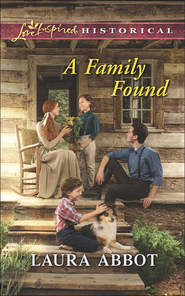По всем вопросам обращайтесь на: info@litportal.ru
(©) 2003-2024.
✖
Into the Wilderness
Настройки чтения
Размер шрифта
Высота строк
Поля
The clatter of mounted horses interrupted her reverie. The arrival of new troops was no novelty, and, like others before them, these soldiers deserved a welcome. Gathering her cloak around her, she waved. Their leader glanced in her direction, smiled and lifted his hat.
Whether it was his erect posture astride the black horse, his light brown curls blowing in the wind or his engaging smile that caused her heart to skip a beat, she couldn’t say. Perhaps it was his air of confidence, the hint of mischief in his smile or his fleeting resemblance to the brother she had lost in the war that moved her. She turned away. He is just another officer, she reminded herself. Just another officer.
Dismayed by her spontaneous reaction to the man, Lily hurried toward home. No good could come from idle speculation about the new captain, handsome or not, and no such man could ever derail the exciting future she planned for herself.
When Lily returned to their quarters attached to the hospital, her sister met her at the door. “You look chilled. Come warm yourself by the fire.” Rose gathered Lily’s cloak and hung it on the hook in the entryway. “I’ve brewed some tea.” She bustled to the stove to fetch it while Lily settled in the rocker in front of the hearth, grateful for her sister’s solicitude. Rose, always a steadying influence, had moved effortlessly into her mother’s homemaking role.
Her ample body swathed in an apron, Rose handed Lily her tea and sat on the bench across from her. “Did you see the new troops arrive?”
“Yes. They’re fortunate to be assigned to this modern post, rather than one of the more primitive ones.”
“And we are fortunate to have received an invitation from Major and Mrs. Hurlburt to dine with them and the newly arrived captain.”
“How thoughtful.” Ordinarily Lily would have been delighted by such a welcome invitation from the fort’s commander and his wife. Yet she was suddenly overcome with uncharacteristic shyness. The possibility of acquaintance with the new captain should not so unnerve her.
Rose leaned forward. “I’m wearing my apple-green. What will you choose?” They smiled in concert, knowing full well that aside from their few everyday dresses and recently discarded mourning clothes, they had only two Sunday gowns. “You look best in the lilac,” Rose ventured. “Do wear it.”
“Why are you so bent on how I look?”
Rose took a sip of tea. “You know I will not leave Papa. I am a homebody. But you? It’s time to consider romance. Past time. If a dashing cavalryman is to sweep anyone off her feet, it is you, dear Lily.”
“Such a prospect! To follow some man from post to post, never having a true home of one’s own.”
“That’s what Mama did,” Rose gently reminded her.
“Yes, but though she never complained to us, I always thought Mama acted more from loyalty than from enthusiasm. Remember when we first arrived here? How she would purse her lips and shake her head with resignation?” Lily squared her shoulders. “I have bigger dreams than living at assorted military establishments.”
“Ah, yes. Your dreams.” Rose’s sigh spoke volumes.
“You just wait. I am determined to seek another path. Mother always planned for one or both of us to visit Aunt Lavinia in St. Louis if she offered to take us under her wing. Think what we could learn there! What we could see! Libraries, museums, theaters—all just waiting for us.” She glowed with the possibilities. “As for courtship, surely there are plenty of men of intellect and substance in the city.” She glanced around the room. “Whatever happens, my future is not in an isolated place like this.”
“Lily, if leaving is truly what you desire, I hope it happens even if I would sorely miss you. Mama recognized our different talents and temperaments. She knew you, not I, would thrive in a more sophisticated environment than rural Iowa or this fort. If Aunt Lavinia’s invitation comes, you are the one to go.”
Lily set down her cup and stretched her feet toward the fire. “Imagine,” she said breathlessly. “St. Louis.”
Lavinia, her mother’s only sister, had married well. Henry Dupree had made a fortune in commerce and doted upon his wife, whose only apparent regret was that she was childless. She had begged Mathilda not to marry Ezra Kellogg, appalled that her sister would settle for being the wife of a small-town doctor. Then the war changed even that, and Lavinia had made no secret of her disappointment at finding Mathilda doomed to the itinerant life of an army surgeon’s wife. Lavinia’s letters following their mother’s death had even intimated that she blamed Ezra for the influenza that had cruelly taken her sister.
Through the years, Lavinia had corresponded regularly, delighting her nieces with the wonders of St. Louis and the gaiety of her social calendar. Lily pored over the back issues of Godey’s Lady’s Book their aunt sent them. Transfixed by illustrations of the latest styles, she could picture herself dancing in the arms of a sophisticated city man at some fashionable soiree. Although she realized she was indulging in romantic fantasy, such daydreams alleviated the loneliness of her existence on the prairie.
Living among men of all ages and stations was not easy. Some ogled, some were crude and others were helpful, going out of their way to assist the surgeon and his household. Tonight she would meet another in a long string of officers, most of whom were either too forward or disdainful of women. Few viewed females as intellectual beings or appreciated a well-read woman. Why should this newly arrived captain be an exception?
Rose gathered their teacups. “We are due at the Hurlburts’ home at six o’clock.”
“Will Papa join us?”
“No, a serious case at the hospital requires his attention.”
Lily seized on the excuse. She often served as her father’s nurse. “Perhaps I am needed there.”
“Papa said to assure you this was a delicate matter best handled by men.”
Later as she and Rose walked toward officers’ row, Lily wished her father’s case had required her assistance. Then she could have avoided testing the giddy feelings of anticipation occasioned by the thought of meeting the new captain.
* * *
Captain Caleb Montgomery held up his arm to halt the cavalry troops behind him. From his vantage point on a small rise, he surveyed the endless expanse of Kansas prairie, barren except for cottonwood trees bordering a sluggish stream, which he took to be the Pawnee Fork of the Arkansas River. In the distance, neatly laid out in a rectangle, were the buildings of Fort Larned, his final duty post before mustering out of the army.
Behind him lay the wagon ruts of the Santa Fe Trail. Protecting it from Indians and renegades was a far cry from the havoc of clashing Union and Reb forces, but that war was over. However, it never left the minds of those who had fought it as he had. Nor would he ever forget the recent heartless attack on Black Kettle and his people at the Washita River in Indian Territory. Both his innocence and the lure of adventure had been lost long ago, obliterated by the bloodshed he had witnessed. Only twenty-seven, he felt much older, seasoned by the harsh reality of “man’s inhumanity to man,” as the poet Robert Burns so aptly put it. Duty and honor remained, but did little to compensate for recurring nightmares. Pushing aside such grim thoughts, he spurred his horse and men toward the fort.
Approaching the compound, he spotted the figure of a woman standing in silhouette against the weak March sun. Tall and slender, she seemed oblivious to their approach. Only as they rode closer did he notice she stood in a cemetery, her eyes fixed on a small headstone. Caleb wondered whose grave she visited and what heartache might be represented by that solitary marker. He had seen many such markers, and, alas, too many comrades buried in nameless graves amid the confusion of battle. At the sound of the troops’ approach, the woman faced them, then lifted her hand in greeting.
Doffing his hat, Caleb turned in his saddle to observe her more closely. She was fair-skinned, and tendrils of honey-hued hair escaped her bonnet. He was seized by an impulse to make her smile, to ease her burden of grief. He grunted. A foolish thought.
Entering the fort, Caleb was struck by the breadth of the parade ground and the height of the flagpole in its center. He drew his men into file for the approach of the commanding officer, Major Robert Hurlburt, who strode toward them. Caleb dismounted and saluted. “Captain Montgomery reporting for duty, sir.”
The post commander returned the salute, then smiled broadly as he extended a hand. “Welcome to Fort Larned.” He nodded at the soldier standing at his elbow. “Sergeant Major, show the men to the stables and then get them settled in the barracks.” He clapped a hand on Caleb’s shoulder. “Officers’ quarters are over there.” He pointed to a row of new houses on the west edge of the parade ground. “My wife and I would be pleased to have you dine with us this evening.”
“It would be an honor, sir.”
Before relinquishing the reins of his horse to a hostler, Caleb stepped forward and stroked the animal’s nose. “Good job, Bucephalus.”
The major regarded the horse. “Bucephalus? A noble enough steed for Alexander the Great. I hope his namesake has served you well.”
“He’s one of the finest, sir,” Caleb said without going into detail about his affection for the horse, which had been with him through many fearsome engagements.
Following the major across the parade ground, Caleb commented on the fort’s modern buildings, which had recently replaced more temporary structures.
Hurlburt nodded. “It is a fine facility. Better than most we’ve both seen, no doubt.”
The major left him at the bachelor officers’ quarters to get settled. Caleb was weary, not just from his travels but from military life, as well. Since enlisting at eighteen after the attack on Fort Sumter, he’d known nothing else. He mentally counted his few remaining months of service, eager to begin the next chapter in his life.
He unpacked quickly, ambivalent—thanks to his exhaustion—about dining at the major’s home, but duty called and he would welcome a home-cooked meal. After washing up, he lathered his face then picked up his razor. Some of his fellow officers prided themselves on luxuriant beards and drooping mustaches. Caleb regarded such practices as peacockery and preferred to be clean shaven. Scraping the blade over his three-days’ growth, he pondered the end of his military career. There were things he would miss—the physical challenges, the sense of accomplishment when missions went well and the camaraderie of his fellow soldiers; but he would never miss the thunder of cannons, the tumult of gunfire or the otherworldly, agonizing cries as bullet or ball ended a life. It was time to settle in one place, to put down roots.
Donning his best uniform, he made his way next door to the post commander’s home, an impressive dwelling with a wide front porch overlooking the parade ground. Major Hurlburt greeted him and drew him into the parlor. “Captain, may I present my wife, Effie.”
Caleb bowed slightly. “An honor, ma’am.”
Mrs. Hurlburt was a plump, middle-aged woman with rosy cheeks, frizzy red hair and mischievous eyes. “Hurly and I are delighted to meet you.”
Hurly? Her use of a pet name for her husband defied the customary formality of such occasions.
Noting the surprise he had been unsuccessful in concealing, she laughed. “I know, I know. We’re supposed to observe stiff conventions. So silly. We are all in a strange place, thrust together by circumstance. Within my home, I will do as I please. Hurly can follow protocol elsewhere.” She laid a hand on Caleb’s sleeve. “I hope I haven’t shocked you.”
Caleb glanced at the major, whose eyes were fixed fondly on his wife. “No, indeed. I shall happily abide by the rules of this house.”
Major Hurlburt moved to a sideboard. “Brandy, Captain? Tea?”
“I’d prefer tea, sir.” While the major prepared his own drink and poured the tea, Caleb studied the room, furnished with a Persian rug, two settees, an armchair, a library table and a small piano. Several watercolor landscapes and embroidered samplers adorned the walls. The decor was tasteful but confining after his months in the field.











